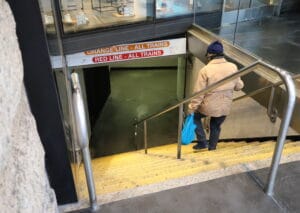
A pedestrian enters the MBTA's Downtown Crossing station in Boston. State House News Service photo | File
A growing chorus of officials and activists have been pushing for the MBTA to roll out a reduced-price option for low-income riders, but launching that kind of a program might rely on an injection of additional funding, the agency’s chief said Friday.
Asked by lawmakers about progress toward a system-wide pilot program to offer low-income fares, MBTA General Manager Steve Poftak said work continues to explore the possible costs and ridership impacts that would be attached.
Early analysis indicates that even a “somewhat modest, circumscribed” program would likely cost at least $50 million and perhaps surpass $100 million, Poftak said, sounding a note of caution about the idea’s financial feasibility.
“Almost every other system that has some type of low-income fare program, it is not funded by the transit authority itself,” Poftak said during a Joint Ways and Means Committee hearing. “The funding for it, in the case of the Metropolitan Transit Authority, it comes from New York City. So I think in many of our discussions, we’ve talked about if there was a durable source of outside revenue to promote a program, we could put one in place.”
The city of Boston spent $500,000 to fund a six-month program eliminating fares on the Route 28 bus, which led to a 22 percent growth in ridership but only saved money for about a third of riders because of charges they incurred elsewhere on the system. Boston will also use about $8 million of its federal funding to cover the costs of a two-year fare-free pilot on the Route 23, Route 28 and Route 29 buses.
Other municipalities have voiced interest in launching additional pilot programs, and discussions with those communities will unfold in the coming weeks, according to Poftak.
The Legislature sought to require the T to launch a low-income fare pilot program as part of a transportation bond bill last session, but Gov. Charlie Baker vetoed that language and lawmakers were unable to override the matter because they sent Baker the legislation too late in the cycle.
An updated bill seeking creation of a low-income fare program (H.3526) once again cleared the state legislature’s Transportation Committee, but has not since advanced or been named a top priority for legislative leaders.




 |
| 

